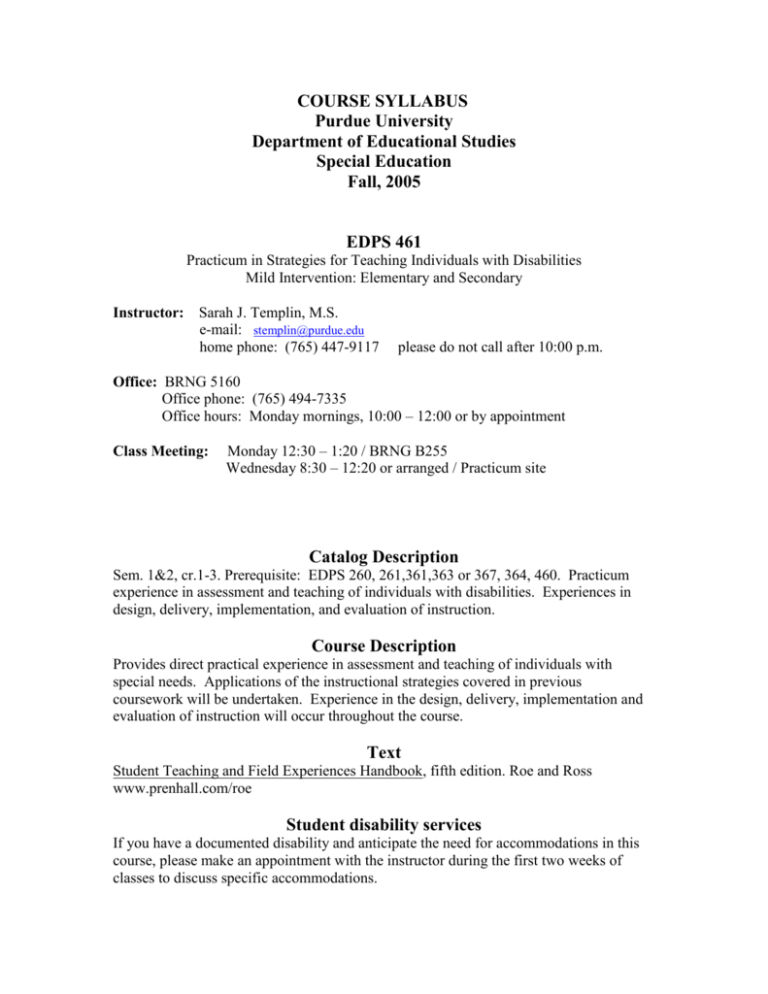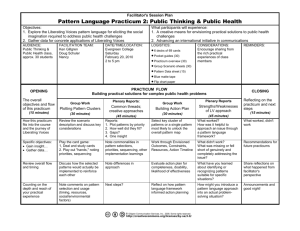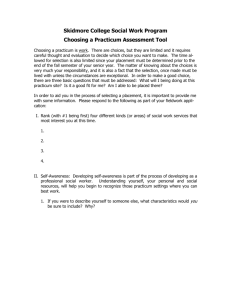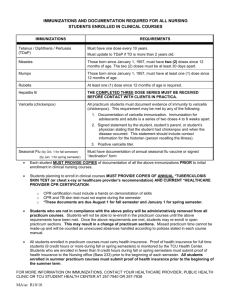EDPS 461, Practicum and Strategies for
advertisement

COURSE SYLLABUS Purdue University Department of Educational Studies Special Education Fall, 2005 EDPS 461 Practicum in Strategies for Teaching Individuals with Disabilities Mild Intervention: Elementary and Secondary Instructor: Sarah J. Templin, M.S. e-mail: stemplin@purdue.edu home phone: (765) 447-9117 please do not call after 10:00 p.m. Office: BRNG 5160 Office phone: (765) 494-7335 Office hours: Monday mornings, 10:00 – 12:00 or by appointment Class Meeting: Monday 12:30 – 1:20 / BRNG B255 Wednesday 8:30 – 12:20 or arranged / Practicum site Catalog Description Sem. 1&2, cr.1-3. Prerequisite: EDPS 260, 261,361,363 or 367, 364, 460. Practicum experience in assessment and teaching of individuals with disabilities. Experiences in design, delivery, implementation, and evaluation of instruction. Course Description Provides direct practical experience in assessment and teaching of individuals with special needs. Applications of the instructional strategies covered in previous coursework will be undertaken. Experience in the design, delivery, implementation and evaluation of instruction will occur throughout the course. Text Student Teaching and Field Experiences Handbook, fifth edition. Roe and Ross www.prenhall.com/roe Student disability services If you have a documented disability and anticipate the need for accommodations in this course, please make an appointment with the instructor during the first two weeks of classes to discuss specific accommodations. Academic Honesty Purdue University expects the highest standards of academic integrity from their students. Students are expected to become familiar with Purdue’s policy on academic honesty by consulting the on-line brochure provided by Purdue’s Office of the Dean of Students (URL: http://www.cc.purdue.edu/ODOS/bacinteg.htm) and the brochure entitled “Academic Integrity: A Guide for Students,” published by the Office of the Dean of Students in conjunction with Purdue Student Government and available through the Office of the Dean of Students. Evaluations Students will be evaluated on the following: 1. Class attendance and participation (15 points) 2. Practicum attendance and participation (20 points) 3. Book review and chapter adaptations (10 points) 4. Resume (5 points) 5. Classroom Behavior Management Plan (3 points) 6. Case Study project (10 points) 7. I.E.P. resources (2 points) 8. Volunteer Observation (5 points) 9. Lesson Plan (10 points) 10. Self-evaluation forms/Weekly journals (10 points) 11. Portfolio (10 points) 100 available points Grading Criteria Semester grades will be determined using the following grading scale: A = 93% and above (93-100 points) B = 85% - 92% (85-92 points) C = 77% - 84% (77-84 points) D = 69% - 76% (69-76 points) F = 68% and below (68 points or less) Attendance and Professionalism Students are required to attend all scheduled classes and complete 24/36/48 hours of observation/ participation at their assigned practicum site depending upon the number of hours of credit that they will be receiving. (1 cr.= 24 hrs. of practicum, 3 cr.= 48 hrs of practicum). Students are expected to participate in all class discussions. Students are expected to act in a professional manner in their practicum site i.e. dress appropriately, arrive on time, practice confidentiality and respect students, teachers and staff. If a student is unable to attend a practicum session, he/she must notify the cooperating teacher and course instructor immediately. INTASC Principles Interstate New Teacher Assessment and Support Consortium (INTASC) Model standards for Beginning Teachers During your experience in EDPS 461 this semester, you will have opportunities to develop knowledge, performance and disposition standards addressed in all of the following INTASC principles: Principle 1: The teacher understands the central concepts, tools of inquiry, and structures of the disciplines and can create learning experiences that make these aspects of subject matter meaningful. Principle 2: The teacher understands how children learn and develop, and can provide learning opportunities that support their intellectual, social and personal development. Principle 3: The teacher understands how students differ in their approaches to learning and creates instructional opportunities that are adapted to diverse learners. Principle 4: The teacher understands and uses a variety of instructional strategies to encourage students’ development of critical thinking, problem solving, and performance skills. Principle 5: The teacher uses and understanding of individual and group motivation and behavior to create a learning environment that encourages positive social interaction, active engagement in learning , and self-motivation. Principle 6: The teacher uses knowledge of effective verbal, nonverbal and media communication techniques to foster active inquiry, collaboration, and supportive interaction in the classroom. Principle 7: The teacher plans instruction based upon knowledge of subject matter, students, the community, and curriculum goals. Principle 8: The teacher understands and uses formal and informal assessment strategies to evaluate and ensure the continuous intellectual, social and physical development of the learner. Principle 9: The teacher is a reflective practitioner who continually evaluates the effects of his/her choices and actions on others (students, parents, and other professionals in the learning community) and who actively seeks out opportunities to grow professionally. Principle 10: The teacher fosters relationships with school colleagues, parents, and agencies in the larger community to support students’ learning and well-being. E-Portfolio Students in EDPS 461 will continue to develop their e-portfolio throughout this semester. The book report with accompanying classroom adaptations is the artifact that has been chosen to represent this course. Course Calendar August 22nd August 29th September 5th September 12th Introduction and course description Professional behavior ASSIGN: Chapter 1 Book report/adaptations Appreciation letter ASSIGN: Chapter 2 DUE: Copy of Appreciation letter Labor Day NO CLASS Due: Letter of Introduction (e-mail draft to me by Wed. 9/7) Communication/Consultation Skills Practicum sites assigned DUE: BOOK REPORT Assign: Abuse and Neglect article September 19th Problem solving/Resources Abuse and Neglect issues ASSIGN: Chapter 3 & Case Study Project September 26th Description of Practicum setting Diversity ASSIGN: Chapter 9 Resume (CH. 10) October 3rd Teaching Strategies/Motivation October 10th October Break - Enjoy October 17th Employment Issues October 24th Case Study ASSIGN: Chapter 10 Class BMP and Volunteer Observation ASSIGN: Lesson Plan DUE: RESUME ASSIGN: Chapters 4 & 5 DUE: CASE STUDY October 31st November 7th November 14th Behavior Management Plan IEPs / case conferences ASSIGN: Chapter 6 DUE: I.E.P. RESOURCES VOLUNTEER OBSERVATION Student Teaching Orientation November 21st Lesson Plan November 28th Guest Speaker December 5th DUE: CLASS BMP ASSIGN: Resources for Writing I.E.P.s DUE: LESSON PLAN DUE: PORTFOLIO Concerns from the classroom “Show and Tell” Portfolios will include …. 1. Teacher appreciation letter 2. Introduction and Thank you letters to cooperating teacher 3. A record of the days/times you attended your practicum site You do not 4. Evaluations from your cooperating teacher need to include 5. Book Report “clean” copies 6. Resume 7. Case Study project 8. Behavior Management Plan (from your classroom) PLEASE 9. I.E.P. resources ORGANIZE YOUR 10. Volunteer observation PORTFOLIO USING 11. Lesson Plan (written, audio tape and critique) “TABS” for each area 12. Synthesis of the course (2 copies) 13. Weekly self-evaluations and journals Council for Exceptional Children (C.E.C.) Extra credit points may be earned by attending CEC meetings this semester. Two (2) points may be earned for each meeting you attend. Verification of attendance will be a brief written overview of the meeting which should be turned in to the instructor no later than 10 days after the scheduled meeting.







